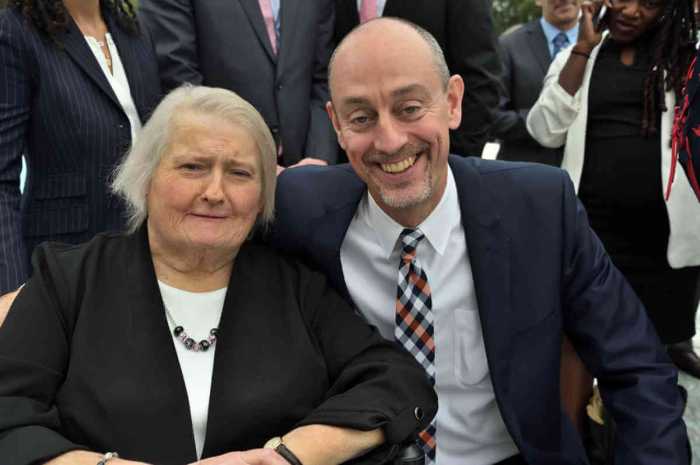A federal district court in Virginia has refused to dismiss a lawsuit challenging the Air Force’s refusal to allow healthy airmen living with HIV to continue serving and deploying to combat zones. At the same time, the court issued a preliminary injunction blocking the plaintiffs’ discharges pending a final ruling on the merits in the case.
Judge Leonie M. Brinkema’s February 15 ruling found that the plaintiffs — two airmen living with HIV as well as OutServe-SLDN, an organization for LGBTQ service members and veterans that is representing other military personnel living with HIV — have “made a strong preliminary showing that the deployment policy applied to asymptomatic HIV-positive service members cannot withstand rational basis review” — the most lenient judicial standard applied to laws and government policies.
Early in the Trump administration, it became clear that the Pentagon would reverse course and systematically dismiss uniformed personnel living with HIV, regardless of the state of their health. Though the government has not said so, the suspicion is that this decision was motivated, at least in part, by a desire to avoid the costs of providing expensive anti-HIV medications.
The situations faced by the two plaintiffs, who are proceeding anonymously as Richard Roe and Victor Voe, illustrate the bizarre anomalies involved here. Both men enlisted shortly after the Don’t Ask, Don’t Tell policy ended in 2011 and had very successful careers until they were diagnosed as HIV-positive in 2017. Though both men have been compliant with their treatment regimens and have undetectable viral loads and no measurable impairments, their careers have been sidelined and their hopes for promotions and overseas deployments stymied. Despite strongly positive recommendations from their commanders and colleagues, the Pentagon’s internal review process has rejected their attempts to remain in the service and both were scheduled for discharge.
Brinkema’s preliminary injunction will keep them in the service while this case plays out and they should be treated as available for overseas deployment.
The Defense Department’s motion to dismiss the case focused on three arguments. First, they claimed that the plaintiffs had failed to exhaust internal Air Force administrative remedies, an argument the judge rejected. Brinkema also rejected the Pentagon’s argument that the two men lacked standing to bring their suits because they had not actually been discharged.
The Defense Department argued, as well, that its personnel decisions based on medical concerns are “altogether immune from judicial scrutiny,” effectively the same argument the government has been making in defense of Trump’s ban on transgender military service. But Brinkema pointed out that military personnel decisions are not wholly free from judicial scrutiny, and, pointing to Fourth Circuit Court of Appeals precedents binding on her, she found that the balance of factors in the case favored allowing it to continue, particularly since “at this preliminary stage, [the plaintiffs] have made a strong showing that defendants’ policies are irrational, based on a flawed understanding of HIV epidemiology, and inconsistently applied.”
“At least at this stage,” Brinkema wrote, “plaintiffs have made a strong and clear showing that defendants’ policies are irrational, outdated, and unnecessary and their decisions arbitrary, unreasoned, and inconsistent.”
In essence, the Defense Department has been proceeding as if treatment for HIV infection were still mired in the futility of the 1980s, when it usually led to severe disability and death. The decision to discharge Roe and Voe was based on their classification as “non-deployable,” which in turn was based on the mischaracterization of their health as presenting unacceptable risks to themselves and others were they deployed overseas. Under inflexible regulations, people living with HIV cannot be deployed without a “waiver” of the general restriction on personnel who have serious medical conditions, and the record before Brinkema includes a statement by the official in charge of the “waiver” process that they would never issue a waiver for somebody living with HIV.
But Brinkema concluded that the Air Force’s application of its regulations is inconsistent with the facts.
“To be sure,” she wrote, “HIV remains incurable, and Roe and Voe must take daily medication to ensure that their viral loads remain suppressed. But that fact does not justify the categorical prohibition at issue here. Although HIV-positive individuals who suddenly stop antiretroviral treatment are vulnerable to ‘viral rebound,’ appreciable physical effects are not immediate.” Even with viral rebound, experts testified, “the virus enters a period of clinical latency that can last years, often with no symptoms of negative health outcomes.”
Brinkema also noted that the plaintiffs had “identified several serious medical conditions treated with daily medication that do not subject service members to the same categorical denial of deployability.”
She concluded that “there appears to be no reason why asymptomatic HIV is singled out for treatment so different from that given to other chronic conditions, all of which are subject to worsening upon disruption of daily medication.”
And, significantly, the judge also noted that those with undetectable viral load “cannot transmit the virus to another,” overriding the Defense Department’s argument about the risk of accidental infection on the battlefield.
The government, Brinkema noted, had totally failed to counter the plaintiffs’ expert medical evidence. The Air Force’s decision to discharge Roe and Voe based not on an individualized assessment, but rather a categorical ban “renders the decision to discharge them arbitrary and capricious.”
Other factors relevant to awarding preliminary relief were all present, the judge found. The men’s military careers would be irreparably damaged by an unjustified discharge, which would also deprive them of continued coverage of military health care. She specifically rejected the Pentagon’s argument that an improper discharge could be remedied after the fact by an award of damages, finding that “the ‘stigma of being removed from active duty and being labeled as unfit for service’ is coupled with the indignity suffered because the reason for their discharges bears no relationship to their ‘ability to perform their jobs.’” That, in turn, could have consequences in their civilian life, the judge concluded.
Brinkema also found that other factors cut in favor of plaintiffs, especially the public interest. These men, dedicated to service with excellent records, were rendering valuable public service that would be interrupted or ended if she did not issue the preliminary injunction.
Because her analysis of the case focused specifically on the practice of the Air Force, Brinkema did not grant the plaintiffs’ request to make her injunction apply to the entire Defense Department, but on the other hand she rejected the government’s request that it apply only to Roe and Voe and not to other similarly situated Air Force personnel.
Lambda Legal joined with OutServe-SLDN to represent the plaintiffs. Laura Cooley and Andrew R. Sommer, pro bono attorneys from the Washington office of Winston & Strawn, also appeared on their behalf.



































